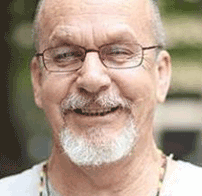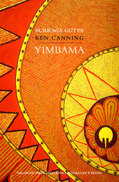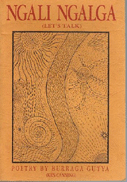Ken Canning – December 24 2017
 Ken is descended from the Kunja Clan of the Bidjara Peoples of South West Queensland on his mother’s side, and from the Irish on his father’s. His language name is Burraga Gutya. Ken started writing over 40 years ago from a prison cell in the old Boggo Road Gaol in Brisbane, learning how to read and write from a fellow inmate. In 1988 he was the first Aboriginal to graduate from the University of Technology, Sydney, obtaining a BA in Communications followed by an MA in Social Science on Aboriginal Oral History. Ken worked for many years in Aboriginal Education, and was a founder and former Academic and Cultural Adviser at the Jumbunna Indigenous House of Learning, University of Technology, Sydney. His poetry has been translated into several languages and he has written a play, 49 Days a Week, as well as a half hour film script titled Cocky on a Biscuit Tin. Ken has been active in many national Aboriginal organisations that have been responsible for the resurgence of First Nations Peoples’ protest against the daily human rights abuses forced upon them in their own lands by consecutive governments.
Ken is descended from the Kunja Clan of the Bidjara Peoples of South West Queensland on his mother’s side, and from the Irish on his father’s. His language name is Burraga Gutya. Ken started writing over 40 years ago from a prison cell in the old Boggo Road Gaol in Brisbane, learning how to read and write from a fellow inmate. In 1988 he was the first Aboriginal to graduate from the University of Technology, Sydney, obtaining a BA in Communications followed by an MA in Social Science on Aboriginal Oral History. Ken worked for many years in Aboriginal Education, and was a founder and former Academic and Cultural Adviser at the Jumbunna Indigenous House of Learning, University of Technology, Sydney. His poetry has been translated into several languages and he has written a play, 49 Days a Week, as well as a half hour film script titled Cocky on a Biscuit Tin. Ken has been active in many national Aboriginal organisations that have been responsible for the resurgence of First Nations Peoples’ protest against the daily human rights abuses forced upon them in their own lands by consecutive governments.
 Yimbama
Yimbama
Vagabond Press, 2015; ISBN 9781922181435
The poems collected here offer an unflinching examination of the lasting damage done to Indigenous Australia by European colonisation and the continuing political struggle. They also reflect Ken’s personal experience. “I have suffered imprisonment and having all dignity stripped away. I have seen our Peoples lost forever in institutions and finally because of this, in later years, I was diagnosed with a schizoaffective disorder …. Some of my poems reflect my feelings of political treachery, oppression and the mental state this leaves ….” As unflinching and uncompromising as these poems are in their protest and dissent, love for country, community and tradition remains central.
 Ngali Ngalga (Let’s Talk)
Ngali Ngalga (Let’s Talk)
Poetry by Burraga Gutya
Breakout Press, 1990; ISBN 9780646006734
“The first poem I ever wrote is in [this] book. I eventually got permission [from the prison authorities] to write and I wrote down the poems I remembered, the ones the screws destroyed, and I wrote other poems. A lot of those poems were rubbish some were so romantic, they were sick but writing was important to me. It was my survival. One bloke told me I had to have rhythm and rhyming schemes and all that and I was doing it but driving myself a bit mad. Then I thought oh bugger this. I was looking for words at the expense of feeling and emotion so I decided to just write what I think. I started writing my own patterns. Long lines then bang, one word. I liked that style. Sometimes it’s a bit disjointed. I like that too.” – Interview with Gaele Sobott, April 2017
